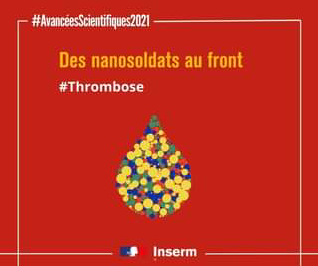When a blood vessel is blocked by a clot, there is currently only one possible treatment: injecting a substance called Alteplase which dissolves the mass of coagulated blood. However, even if this medicine is quickly broken down by the body, it can cause bleeding and permanently disrupt blood circulation. However, Alina Zenych, within the team of Cédric Chauvierre at the University of Paris / INSERM U1148 LVTS, has developed a new technique to administer the treatment to patients while reducing the risks: the researchers coated the Alteplase in a sugar nanoparticle, coated with a natural substance that has a strong affinity for a protein expressed on the surface of clots, P-selectin. The experiments, carried out in vitro and in vivo on rodents, confirm the effectiveness of this method, which makes it possible to target the clot very precisely without impairing general blood circulation, while reducing the risk of hemorrhage. Future work will be to improve the dissolution of the clot by adding other active substances to the capsule.
Article: A Zenych et al. Biomaterials. DOI: 10.1016/j.biomaterials.2021.121102

